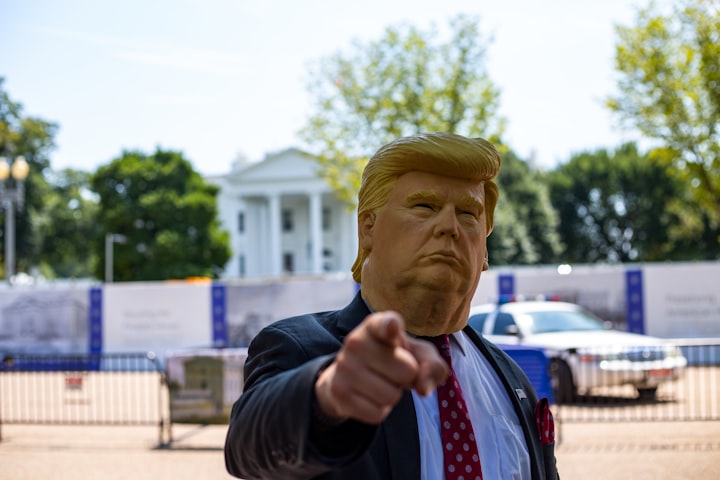Meme Of Reflection
This story could focus on the power of memes and media in shaping public opinion. When Trump's mugshot goes viral as a meme, the narrative could highlight the ethical implications of using humor to address serious matters and how quickly misinformation and biased perspectives can spread through social media.

The world had changed dramatically since the days of political turmoil and division. Former President Trump's legal issues were finally catching up with him, and the once powerful figure found himself in custody, facing a reality he had never thought possible. The world watched with bated breath as the news spread, but what no one anticipated was the emotional journey that lay ahead.
As mugshots of Trump began circulating online, memes were inevitable. Some were malicious, reveling in his downfall, while others were laden with sarcasm and derision. But among them emerged a series of memes that took a different approach—ones that captured the complexity of the situation and the emotions that were stirred.
One such meme depicted Trump, his face somber and contemplative, with a simple caption: "Reflection in Captivity." It was this meme that caught the attention of Maria, a woman who had fervently opposed Trump's policies during his presidency. She had been a vocal critic, participating in protests and debates, convinced of her own righteousness.
Curiosity piqued, Maria clicked on the meme and began reading the accompanying thread. To her surprise, the conversation was not a heated exchange of insults but a nuanced discussion on accountability, power, and redemption. As she read through the comments, she realized that people from all walks of life were engaging with empathy, sharing their perspectives, and challenging their own biases.
One comment stood out: "We can't let memes be our only way of addressing this. We need to remember that behind every image is a human being dealing with the consequences of their choices." It was a sentiment that resonated deeply with Maria, and she found herself moved by the thought of Trump as a person grappling with his past actions.
Over the following weeks, the meme and its associated discussions continued to gain traction. People started to consider the emotional toll that public scrutiny, legal battles, and isolation might be taking on Trump. Some individuals who had once staunchly supported him were now openly criticizing him, while others were willing to acknowledge the complexity of his situation.
As Maria read more and engaged in conversations, she felt a shift within herself. She began to question her own approach to political discourse and realized that while her disagreements with Trump were valid, reducing him to a caricature had never been productive. She started to see the power of empathy in fostering genuine understanding and growth.
Driven by her changing perspective, Maria decided to attend a public discussion event focused on the role of memes in shaping public opinion. The event brought together a diverse group of individuals, from meme creators to psychologists and activists. As they explored the nuances of meme culture and its impact, Maria raised her hand to share her own story.
Tears welled up in her eyes as she spoke about her transformation—from an impassioned protester to someone willing to engage in empathy-driven conversations. She talked about the "Reflection in Captivity" meme and how it had opened her eyes to the shared humanity that connected all individuals, regardless of their beliefs.
Her words resonated with the audience, and the event's discussion took on a deeper, more emotional tone. People began sharing their own experiences of personal growth, shifting perspectives, and the challenges of addressing complex issues in the age of viral memes.
The "Reflection in Captivity" meme had become a catalyst for change, an unexpected emblem of empathy in a time of division. As the story spread, it inspired others to look beyond the surface, to question their own biases, and to engage in conversations that transcended political lines.
In the end, the meme served as a reminder that even in the face of profound differences, the power of human connection and understanding could help bridge the gap between opposing viewpoints. It was a story of emotional evolution, a tale of transformation that demonstrated the capacity for growth within each individual, even in the midst of contentious times.
Months passed, and the impact of the "Reflection in Captivity" meme continued to reverberate through society. People had become more open to seeing beyond their preconceived notions, and discussions that once seemed impossible were now happening across the nation.
Maria's journey of empathy didn't stop at attending one event or sharing her story. Encouraged by the positive response she received, she became a vocal advocate for promoting understanding and civil discourse. She started organizing workshops that focused on empathy-driven conversations, bringing together people from diverse backgrounds to engage in respectful debates.
One day, as Maria was preparing for another workshop, she received an unexpected email. The subject line read, "An Invitation to Listen." Curious, she opened the message to find a heartfelt letter from someone who identified themselves as a former Trump supporter named John. He shared his personal struggles, the reasons that had led him to support Trump, and the gradual realization that his beliefs might have been misguided.
Maria was deeply moved by John's words and decided to reach out to him. They began exchanging emails, sharing their stories, and discussing their respective perspectives. As their conversations continued, Maria and John discovered common ground they hadn't thought possible. They both had fears about the state of the nation, worries about their families' futures, and a desire for a better world.
Eventually, Maria suggested they meet in person. She wanted to put a face to the name and truly understand the person behind the emails. John agreed, and they arranged to meet at a local café. As they saw each other for the first time, there was a moment of uncertainty mixed with anticipation. But as they began talking, they found that the emotions that had drawn them to their screens were even stronger in person.
Their conversation flowed freely, punctuated by moments of laughter, empathy, and, at times, vulnerability. They shared stories about their childhoods, their dreams, and the fears that had fueled their beliefs. As the hours passed, they realized that their differences were not insurmountable barriers but opportunities for growth and understanding.
In the following months, Maria and John's friendship deepened. They continued their workshops together, showcasing their unlikely alliance as a testament to the power of genuine dialogue. The media caught wind of their story, and soon, they were invited to panel discussions, podcasts, and interviews. Their journey from polarized opponents to empathetic allies resonated with people across the nation who were longing for connection amidst divisiveness.
One day, as they were speaking at a university event, Maria shared a message that captured the essence of their journey. "Memes can be powerful tools," she said, "but their true potential lies in how they can spark conversations that transcend the superficial. We should aim not just to create memes for likes and shares, but for change and understanding."
Their story continued to inspire others to seek common ground and approach differences with empathy. The "Reflection in Captivity" meme had initiated a ripple effect of change that reached far beyond its digital origins. It had become a symbol of hope, a reminder that amidst the chaos of modern communication, meaningful connections could still be forged.
In the end, the emotional journey that started with a meme had transformed not only the lives of Maria and John but also the lives of countless others. It was a testament to the power of stories to shape perceptions, change hearts, and bring people together, even in the face of the most divisive of subjects.
And as society moved forward, people began to remember that behind every image, every meme, and every person, there was a complex and emotional story waiting to be heard.






Comments
There are no comments for this story
Be the first to respond and start the conversation.